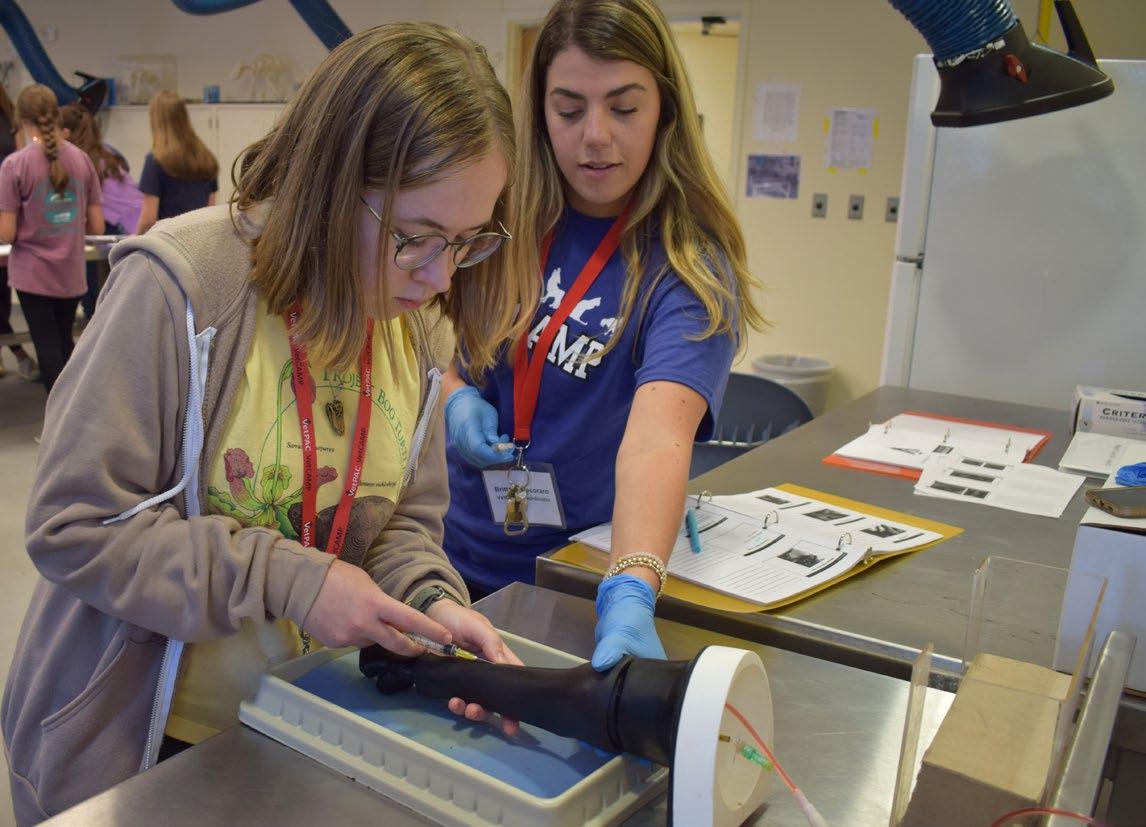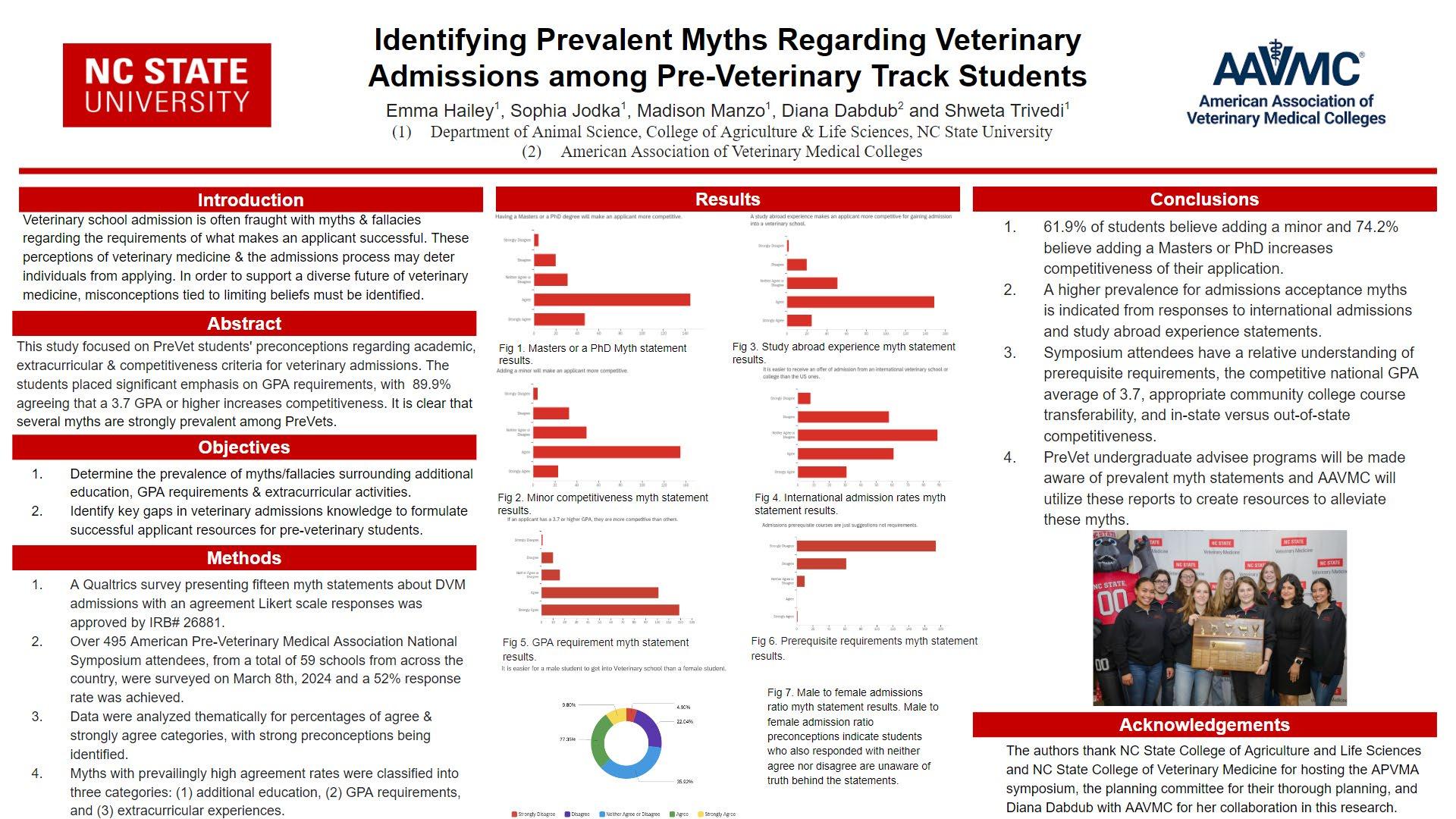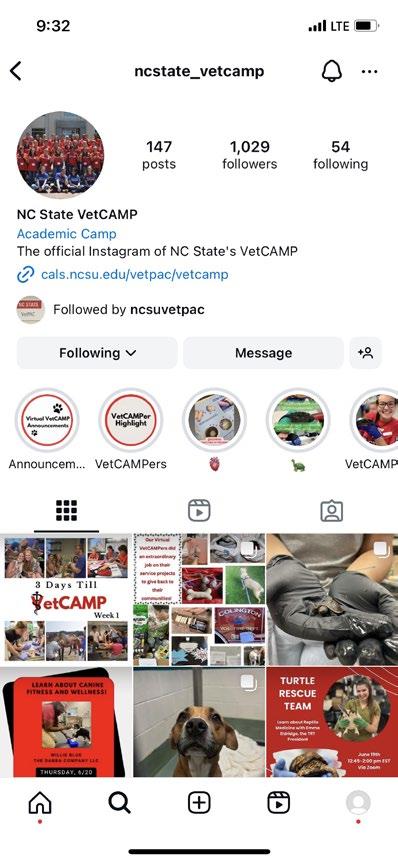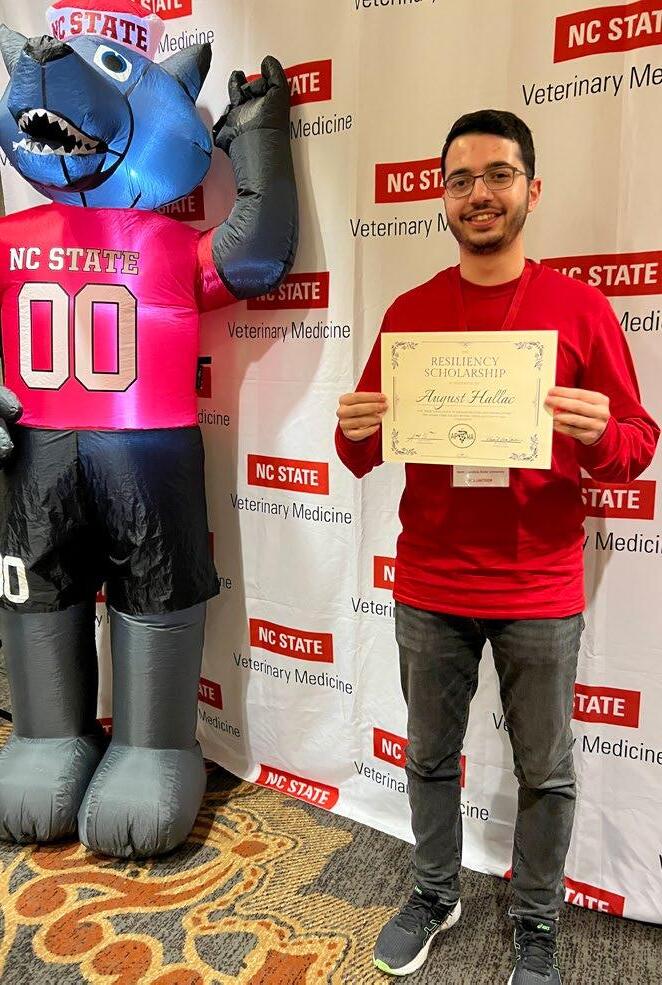
VetPAC Impact 2023–24
“Hosting APVMA Annual Symposium at CVM & CALS for the third time was a great honor for us. It provided pre-veterinary students & professional partners from across the country a decidedly informative and collaborative platform for exploration of veterinary medicine as a career.” VetPAC
Dr. Trivedi, Director, VetPAC
12
Interns
The VetPAC interns assisted with annual programming such as hosting peer advising appointments, organizing key events like the Fall Seminar Series and Pre-Vet First Year Orientation as well as meeting with prospective pre-vet students during NC State Undergraduate and CVM Open Houses. Interns served as an essential resource for the VetCAMP planning committee by assisting with application review and camp preparation. Additionally, interns connected with a variety of veterinary professionals while attending the NC Veterinary Conference and assisted with the planning and hosting of the 2024 APVMA Annual Symposium.

14
Interns
Shelter Medicine Internship
Hosted by Orange County Animal Services and Wake County Animal Center, the Shelter Medicine internship provided hands-on experience for undergraduates interested in Shelter Medicine. Under the mentorship of Dr. Strong (OCAS) and Dr. McCain (WCAC), interns assisted health care technicians with physical exams, deworming, microchipping, vaccinations, and surgical preparation. Interns gained a comprehensive understanding of shelter husbandry, animal behavior in a shelter setting and shelter veterinary practices, along with 50 hours of veterinary experience.
“Stepping into the VetPAC internship meant stepping out of my comfort zone, it was a transformative journey of personal growth in leadership and communication.”
Lai’la Harris VetPAC Intern,
2023-24

“The VetPAC internship provided a fun, challenging atmosphere that promoted leadership development, provided networking opportunities, and created an avenue to further engage and contribute to the NC State community.”
Kate Healy VetPAC Intern, 2023-24
8
Interns
Museum Medicine Internship
At the North Carolina Museum of Natural Sciences, Museum Medicine interns assisted museum veterinary staff with routine wellness exams, treatments, and diagnostic tests for their exotic animal collection. The museum’s collection included arachnids, invertebrates, reptiles, birds, and amphibians. Under the mentorship of Dr. Dombrowski, interns gained experience in the medical management and husbandry care of exotics species. Interns also developed their public speaking skills through the Museum’s Window on Animal Health, an exhibit that allows visitors to interact with veterinary staff as they perform veterinary procedures.
Feline Health Internship
3
Interns
10
Interns
The Orange County Animal Shelter hosted the Feline Health internship; which allowed interns to gain shelter companion animal husbandry and shelter medicine experience. Under the supervision of Dr. Sandra Strong and shelter staff, interns assisted with kitten intake/ processing, microchip insertions, medication administration and kitten foster communications. Interns were given the opportunity to assist veterinarians with feline spays and neuters, surgical preparation and veterinary exams. Throughout the internship, interns also participated in an ongoing research project related to neonatal mortality.
Canine College Internship
Canine College interns helped provide lab animal enrichment and socialization to a stock colony of purpose-bred research dogs at the NC State’s College of Veterinary Medicine. Through this experience, interns gained a foundational knowledge of lab animal husbandry, canine handling/training techniques as well as networked professionally with CVM staff and current veterinary students. Interns also particpated in a semester-long research project related to the enrichment and care of labratory animals. Fall 2023 and Spring 2024 interns presented their research, “A Lab Animal Research Study- Can Old Dogs Learn New Tricks?,” at the Spring 2024 Undergraduate Research and Creativity Symposium at NC State.



101
Students Hosted
Spend a Day at State (SADAS) >
Through this CALS program, VetPAC interns met with future pre-vet students and their families to introduce them to the pre-vet life at NC State. Interns talked to prospective students about VetPAC’s resources and internships for undergraduates, information regarding NC State CVM admissions, as well as highlighting the pre-college program, VetCAMP. Each family was provided an informational packet with supplemental materials such as a VetPAC brochure and pre-vet journey tips. Following the presentation, interns accompanied the students and their families on their walk to an animal science lecture (Intro to Companion Animals (Fall) and Professional Development of Pre-Veterinary Track Students (Spring)).
VetCAMP
82
Campers
VetCAMP is a pre-college program for high school students interested in veterinary medicine. Hosted during the summer, VetCAMP programming consisted of hands on experiences at the NC State Educational Units, a tour of NC State University’s campus, a small animal basic exam and suture lab, as well as an anatomy and physiology lecture followed by dissections of the heart and brain. Campers also participated in a service project, donating nearly 200 lbs. of food to the NC State Pack Pantry and 118 dog toys and 74 cat toys to the Wake County SPCA and Animal Shelter.


93
Students
Virtual VetCAMP
Virtual VetCAMP is a weeklong online program, hosted on Zoom, designed to offer high school students a similar experience to in-person VetCAMP with added flexibility. New to Virtual VetCAMP, campers were able to purchase a dissection kit and preform self-guided dissections. The optional dissection kit included a brain, heart, eye, kidney and fetal pig. Campers also had the opportunity to interact with variety of veterinary professionals such as the staff at the NC Museum of Natural Science’s Window on Animal Health, the NC State CVM Admissions Team and the NC State CVM Turtle Rescue Team.
271
Students
Open House Attendance
The VetPAC Director, Program Associate and interns attended the NC State University open house in October. During this event, the VetPAC Director presented at the town hall for future students and their families, and the VetPAC Program Associate and interns hosted an informational booth. The VetPAC Program Associate and interns also attended the CVM Open House in March. During these events, VetPAC staff and interns showcased a myriad of VetPAC resources and opportunities; such as VetCAMP, Spend a Day at State, peer advising, VetPAC internships, and study abroad programs.
202
Attendees
VetPAC Fall Seminar Series
“Networking Events with Veterinary Professionals”
VetPAC restructured the Fall Seminar Series into mini networking events for pre-vet students. These small scale networking events were hosted in lieu of the Spring Annual Networking Event as VetPAC was hosting and planning the 2024 APVMA Annual Symposium. Each networking event focused on a specific area of study or interest and hosted a variety of veterinary professionals; allowing students to network on a smaller and more personalized scale.
Networking Event Topics:
> Small Animal Medicine (44 attendees)
> Large Animal/ Food Animal (70 attendees)
> Industry and Government (30 attendees)
> Exotic Animal/ CVM Admissions (58 attendees)
Pre-Vet First Year Orientation
82
Attendees
VetPAC’s 6th First Year Orientation invited first-year and new transfer students to participate in an interactive Q&A with NC State CVM admissions team; offering insights into a successful VMCAS application as well as a variety of workshops. Participants were given the option to attend any two of the following workshops; stress prevention and management, career mapping, and the exploration of VetPAC’s pre-vet resources. Students also received an informational packet comprised of a VetPAC Brochure, the VetPAC Impact Report, and various handouts on VetPAC resources.

686 Students
Total Pre-Veterinary Students in VetPAC

ANS 281: Professional Development of Pre-Veterinary Track Students
82
Students
Admitted
25
Students
The professional development course utilized a combination of learning formats, combining in-person lectures with online lectures via Zoom. During the course, students were introduced to the VMCAS application system and were provided tips for diversifying their applications through their experiences and personal statement. Online lectures facilitated the attendance of guest speakers from various veterinary specialties including lab animal, food animal, and exotics. Additionally, students were provided information on important topics such as the dual degree program and DVM financing from NC State financial advisors.
ANS 395: Introduction to Animal Behavior and Veterinary Physiotherapy in UK
This study abroad course allowed students to study animal behavior and veterinary physiotherapy by attending labs and lectures at Harper Adams University. Students also participated in field activities with a focus on pain management and recovery for a variety of animals. Students were able to work handson with horses, dogs, pigs, dairy cows, gerbils, and rats. Course content included anatomy, biomechanics, physiotherapy techniques, hydrotherapy, and animal behavior and environments. Students also participated in a variety of cultural activities and excursions.

34
Students
ANS 395: Wildlife Management and Conservation in South Africa
Since its development in 2016, the Wildlife Management and Conservation course in South Africa has hosted 131 pre-veterinary students. In 2023, this course was offered in South Africa for the final time allowing participants to learn about game farmer breeding and the conservation of endangered wild animals. Participants interacted with a variety of animals, including the Wildebeest, Roan Antelope, Impala, Kudu, Wild Dogs, Cape Buffalo and Waterbucks while assisting with animal restraint and relocation, ear tagging and microchip placement, pregnancy checks, injections, monitoring respiration, performing necropsies, and DNA collection. Another Wildlife Management and Conservation course was developed in Costa Rica to start in the Summer of 2024.

495
American Pre-Veterinary Medical Association (APVMA) Symposium
92 Volunteers
Attendees 12
Interns
In partnership with NC State CVM, VetPAC hosted the 2024 APVMA symposium for the 3rd time. APVMA is a prestigious symposium designed to expose pre-vet students to the diversity of the profession, while also providing networking opportunities. The symposium offered a total of 18 labs and 30 lectures to 495 attendees, 22 of which are current NC State Students. Furthermore, the symposium hosted 26 advisors, 59 schools from across the country and 40 exhibitor tables with 71 exhibitors. Participants gained multiple hands-on experiences through interactive labs including a suture lab, fish necropsy, equine muscle painting, as well as heart and brain dissections.
North Carolina Veterinary Conference (NCVC)
VetPAC supported the attendance of 12 interns to the NCVC in Raleigh, North Carolina. Interns attended seminars on innovative and expanding research including “Food Allergies in Dogs and Cats: Serum Allergy Test or Elimination Diet Trial?”, “Practical Approaches for the Laminitic Horse,” and “Current Topics in Animal Emergency Management.” Interns hosted an informational booth during the conference; allowing them to network with various veterinary professionals. Interns also reflected on their experience of attending NCVC; with many commenting on the importance of professional networking opportunities and obtaining diverse experiences.



Identifying Prevalent Myths Regarding Veterinary Admissions among Pre-Veterinary Track Students A survey based study that focused on pre-vet students’ preconceptions regarding academic, extracurricular and experiential criteria for veterinary admissions. Over 495 American Pre-Veterinary Medical Association National Symposium attendees, from 59 schools, were surveyed on March 8th, 2024 and a 52% response rate was achieved. Participating students placed significant emphasis on GPA requirements, with 89.9% agreeing that a 3.7 GPA or higher increases competitiveness. It is clear that several myths continue to be prevalent among pre-vets.

A
Lab Animal Research Study- Can Old Dogs Learn New Tricks? As part of the Canine College internship, Fall 2023 and Spring 2024 interns learned about laboratory animal medicine and its importance, factors of canine enrichment, and learned research principles to explore how responsive purpose-bred research beagles and hound canines were to training based upon different factors. These factors included age, sex, and the breed of canine on the ability to acquire new skills in a given amount of time. Results showed that all ages and breeds of canines had the ability to learn new skills despite age, breed, or sex. The data also showed a weak correlation between a canine’s age and ability to learn a new skill.

Assessment of Stress in Undergraduate Anatomy- Lab using Salivary Amylase & DASS-21 Stress levels were assessed in students attending the Spring 2023 ANS 206: Anatomy of Domestic Animals Lab (Sections 201 & 202) by utilizing salivary Alpha Amylase and a DASS-21 survey. Over the course of 16 weeks, samples were collected from 45 students on 2 of the lecture days and 2 of the practical days. Upon data analysis, all four means for sAA levels were approximately the same over the different data points, making it clear that we cannot predict anything about a student’s anxiety, depression or stress based on their amylase levels.

The Impact of Enclothed Cognition on Undergraduate Animal Science Students in Anatomy Labs Enclothed cognition through the use of lab coats has been shown to increase science self-efficacy and STEM career interest in adolescents. This study assessed the impact of wearing a lab coat in an undergraduate animal science anatomy lab. The undergraduate students of ANS 206 were divided into the control (201, no coats) and experimental groups (202, coats). Student perceptions of their performance were assessed via pre- and post- semester surveys. Preliminary data analysis suggests students wearing lab coats had a higher academic performance and career motivation than the ones who did not.



